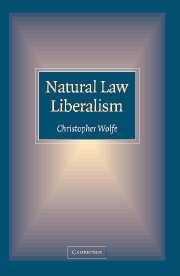Book contents
- Frontmatter
- Contents
- Acknowledgments
- Introduction
- PART I CONTEMPORARY LIBERALISM
- 1 Contemporary Liberal Exclusionism I: John Rawls's Antiperfectionist Liberalism
- 2 Contemporary Liberal Exclusionism II: Rawls, Macedo, and “Neutral” Liberal Public Reason
- 3 Contemporary Liberal Exclusionism III: Gutmann and Thompson on “Reciprocity”
- 4 Contemporary Liberalism and Autonomy I: Ronald Dworkin on Paternalism
- 5 Contemporary Liberalism and Autonomy II: Joseph Raz on Trust and Citizenship
- 6 “Offensive Liberalism”: Macedo and “Liberal” Education
- PART II LIBERALISM AND NATURAL LAW
- Index
3 - Contemporary Liberal Exclusionism III: Gutmann and Thompson on “Reciprocity”
Published online by Cambridge University Press: 24 July 2009
- Frontmatter
- Contents
- Acknowledgments
- Introduction
- PART I CONTEMPORARY LIBERALISM
- 1 Contemporary Liberal Exclusionism I: John Rawls's Antiperfectionist Liberalism
- 2 Contemporary Liberal Exclusionism II: Rawls, Macedo, and “Neutral” Liberal Public Reason
- 3 Contemporary Liberal Exclusionism III: Gutmann and Thompson on “Reciprocity”
- 4 Contemporary Liberalism and Autonomy I: Ronald Dworkin on Paternalism
- 5 Contemporary Liberalism and Autonomy II: Joseph Raz on Trust and Citizenship
- 6 “Offensive Liberalism”: Macedo and “Liberal” Education
- PART II LIBERALISM AND NATURAL LAW
- Index
Summary
We have seen that some contemporary liberals seek to exclude an important range of arguments from contemporary debate by requiring a form of liberal “neutrality” embodied in the concept of “public reason.” In this chapter, I want to turn to another way in which some contemporary liberals attempt to exclude important moral arguments from public debate. Amy Gutmann and Dennis Thompson argue in their Democracy and Disagreement that appropriate conditions of public deliberation exclude certain forms of argument. The excluded forms of argument include some that are at the core of natural law arguments for public morality. For reasons similar to those we have seen in previous chapters, I want to argue that Gutmann and Thompson's arguments are not persuasive, and provide no legitimate grounds for putting natural law arguments in favor of public morality off-limits in a liberal democracy.
The Condition of Reciprocity
One of the requirements for democratic deliberation, according to Gutmann and Thompson, is reciprocity:
The foundation of reciprocity is the capacity to seek fair terms of social cooperation for their own sake. Because the results of democratic deliberation are mutually binding, citizens should aspire to a kind of political reasoning that is mutually justifiable. From a deliberative perspective, a citizen offers reasons that can be accepted by others who are similarly motivated to find reasons that can be accepted by others.
Deliberative reciprocity involves two requirements. First, there is the moral requirement that when citizens make moral claims “they appeal to reasons or principles that can be shared by fellow citizens” who share their commitment to finding fair terms of social cooperation.
- Type
- Chapter
- Information
- Natural Law Liberalism , pp. 44 - 56Publisher: Cambridge University PressPrint publication year: 2006

